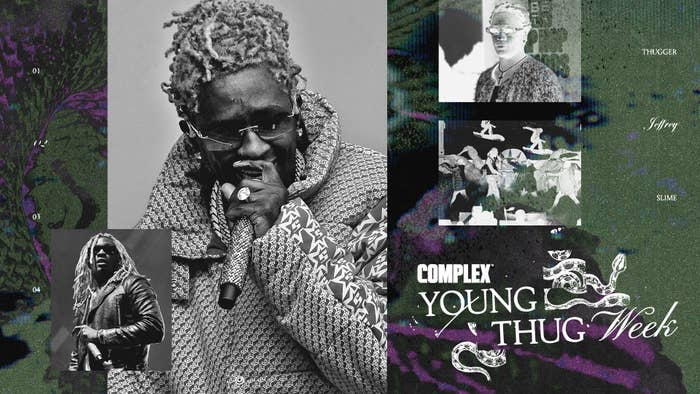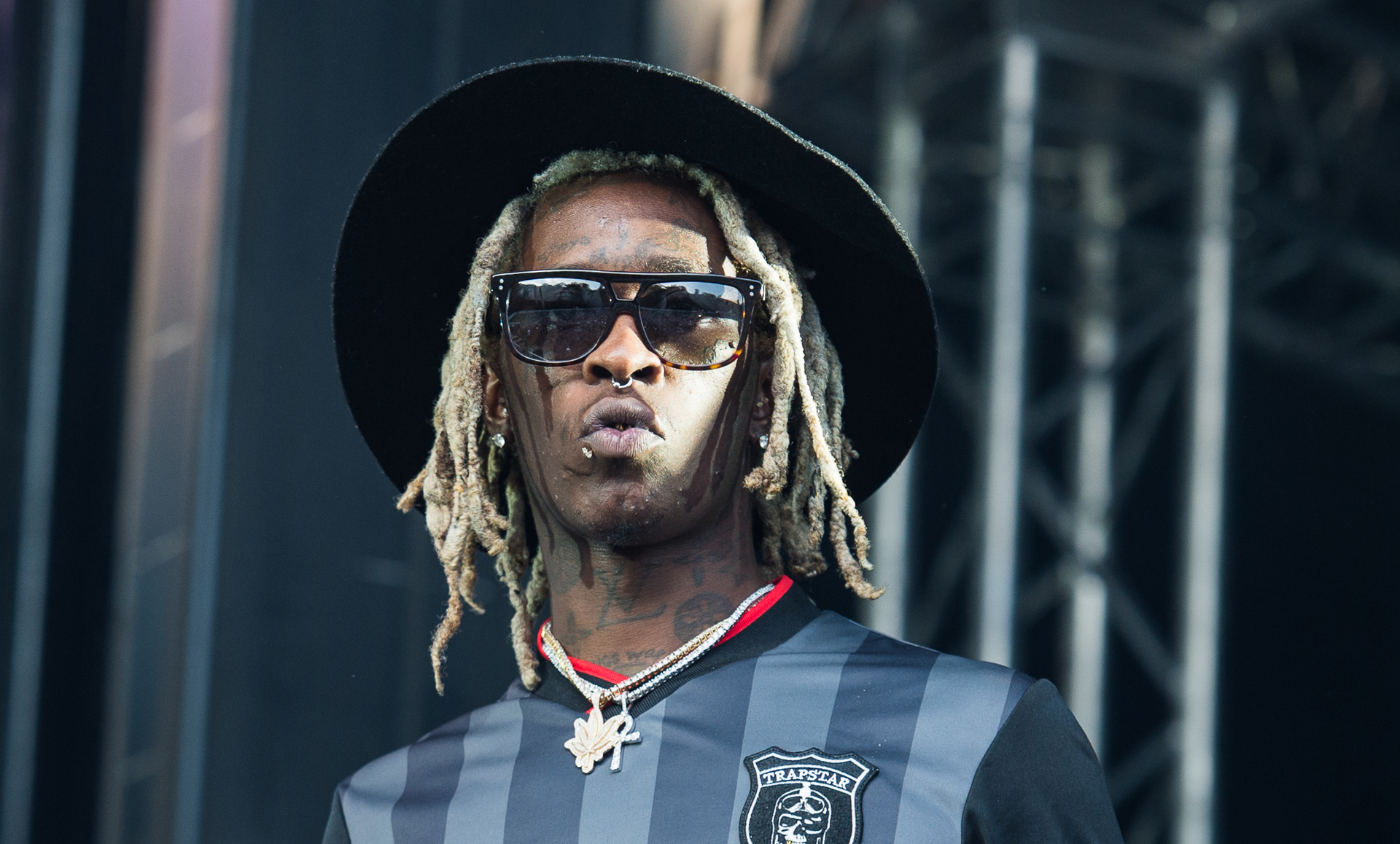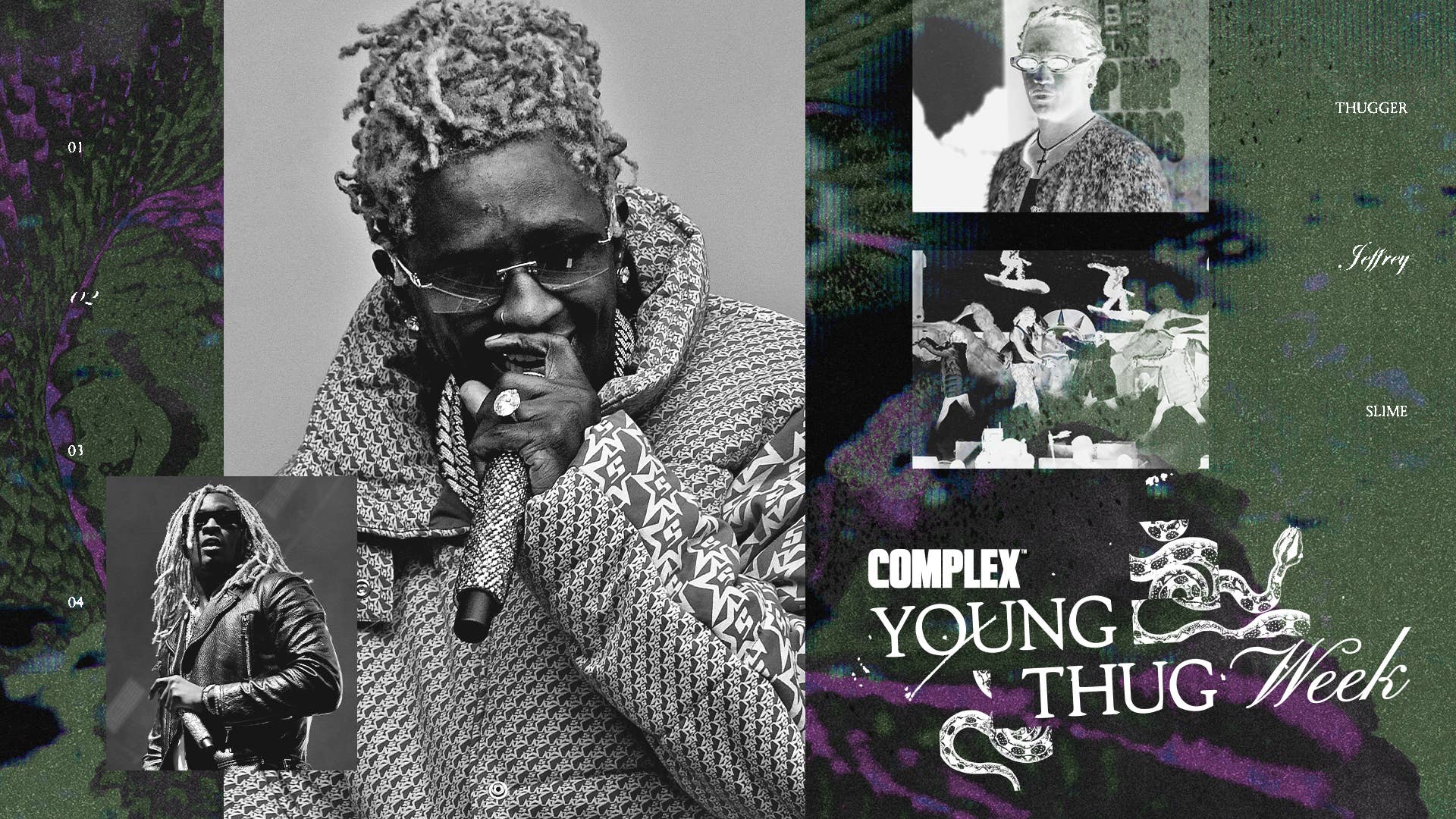
It’s Young Thug Week at Complex! Leading up to the release of his new album ‘Punk’ on Friday, we’re diving deep on the influential rapper’s career, publishing new interviews, essays, and lists each day of the week. Follow along here.
In the early 2010s, the blueprint for what an MC could be was changing. A hoard of genre-bending, crooning artists had collectively expanded the confines of the rap game, and from those margins came Young Thug, an Atlanta rapper with a melody-driven sound and an unfettered eccentricity that defied the straightforwardness of his name.
His dynamism has captivated a worldwide stanbase, but threatened rap traditionalists from seemingly day one as he released bemusing breakouts like “Stoner” and “Danny Glover.” And it only intensified when he put on a dress. Young Thug has been rapping for just under a decade, and in that time he’s helped inspire a generation of chart-topping protégés, sold millions of units, won a Grammy, and affirmed just how left-field hip-hop can go. As of late, he’s been embracing his role as a young OG by putting on the next generation of artists.
The rap game is one of the only communities that empowers Black men to do just about whatever they want. So often, we see hurtful manifestations of that power, and Thug isn’t above those moments himself, but his pronounced impact on rap comes from his willingness to thwart cultural norms, whether it’s preconceived notions about how he should be rapping or what he should be wearing. Some accused him of merely attention-seeking when he achieved notoriety in 2014, but as his career has progressed and he’s divulged more about himself, it’s become more evident that he’s not fixated about toeing the line as much as he is heedlessly stepping over it. He’s marching to his own drum. Thug’s innovation, subversion, and illimitable vocal talent has made him one of the most compelling rappers of the 21st century.
It’s fitting that Thug, like so many other 2010s ATLiens, came up from Gucci Mane’s Brick Factory studios. He grew up in Atlanta’s Zone 3 in Jonesboro Projects, an area that informs the harshness of some of his lyrics. His childhood friend and rapper Capo has told a story about beefing with neighbors and having Thug knock on their door to lure them to the front where Capo shot at them, a gruff indication that Thug’s bars aren’t far removed from his upbringing. He put that experience into his music, and Peewee Longway, another neighborhood friend, helped him get his first break. One might assume Thug’s origin story would be someone hearing his high-pitched crooning and being instantly hooked, but Gucci says he signed Thug for $25,000 without even hearing a song. Who knows how many bets Guwop has made in his life, but the payoff from this one has to be high on the list.

The 1017 Thug tape helped Thug break out off the strength of songs like “Pikacho,” a fun ode to his “winking” diamonds. Later in 2013, he followed up with his first official single “Stoner,” a track that made rap’s age-old weed obsession sound fresh, and “Danny Glover,” a beguiling plea to ménage à trois, with a hook so catchy even a chaste listener might belt it out. To a layman listener, Thug might have just sounded like another artist singing over a rap beat. But a deeper listen elucidates that he was cultivating his own style. His vocals had some of Future’s throaty forcefulness, and some of Wayne’s high-pitched wailing, but it was its own thing, as undefinable as his lyrics were indiscernible. We didn’t always know what he was saying, but it felt (and sounded) good.
Thug had star potential from the beginning. He ran into some industry red tape in 2014 when Atlantic Records imprint Artist Partners Group and Gucci Mane began wrangling over his contract. He thought he was free to sign elsewhere after Gucci Mane went to jail and reportedly told Thug he was free to explore his career elsewhere. So he signed a 360 deal with APG for apparently just $30,000. Things quickly soured between Thug and the imprint, leaving him in the spot no artist wants: stuck in a bad deal.
In 2012, he told Redditors in an AMA, “I focus on music, I let them stress legalities and royalties.” That music-first mindset may have helped carry him through the legal woes, and the setbacks couldn’t thwart the buzz he was building from both fans and those who were gawking at his social media antics.
Rap traditionalists have to accept that their forefathers gave rap to the world, and in turn, the world gave us sonic mavericks like Young Thug.
Fans had begun to notice him calling his male friends “hubby,” “bae,” and “lover” on Twitter and Instagram, which rang off alarms with swathes of rap’s homophobic fans. Straight men of all ages still use “pause,” so his terms of affection caught a side-eye from many, as did a photo of him and a hospital-bed-bound male friend feeding each other from double cups, as well as a video of him doing a bumbling, twerk-adjace dance to his “Perk” song. A YouTube commenter on the dancing video noted, “For those who say he isn’t gay… explain this, don’t worry, I have time,” capturing the sentiment of many rap listeners at the time.
When asked about his “bae” comments, he clarified, “It’s the language. It’s nothing stupid and fruity going on. It’s the way we talk, it’s the way we live. Those are my baes, those are my lovers, my hubbies, whatever you want to call them.”
Some people believe he’s actually gay or bisexual, while others believe he’s simply trolling rap’s latent homophobia, knowing that anything out of the strait-laced norm would rile men (and the news cycle) in a similar manner to what Lil Nas X is doing these days. Thug’s music and personality made him one of the rap game’s most polarizing artists, often juxtaposed against ’90s faves in “your era vs. my era” memes, and vilified as the fulcrum of an “emasculation agenda.” Rap traditionalists have shown they rue any man with so-called feminine traits, and they’re annoyed by anyone who isn’t rapping like they’re trying to one-up Illmatic. Thug was guilty of both. He’s flamboyant. He’s unbothered by criticisms and opinions about how people think he should conduct himself. Some have even said he was a “post-verbal” revolutionary, which riled fans of wordsmiths. The same things that made him an exciting phenomenon to fans alienated him from those reared on traditionally masculine rappers who prided themselves on rapping with a lazer’s precision.
View this video on YouTube
Rap traditionalists have to accept that their forefathers gave rap to the world, and in turn, the world gave us sonic mavericks like Young Thug. Rap would not be the biggest force in the world if artists stayed stagnant and didn’t find ways to incorporate other musical influences and vocal approaches into the pot. The same adventurism that gets denigrated as “not real hip-hop” should actually be lauded for displaying the possibilities of rap. And if those diehards at least accepted his presence instead of resenting it, they’d realize that Thug is a pretty damn good rapper when he vies to stay inside traditionalist lines.
There’s his autobiographical verse on Drake’s “Sacrifices,” where he holds his own next to two respected MCs in Drake and 2 Chainz. On “Drippin,” he unfurls the kind of thrilling, dexterous flow that is the epitome of technical precision. His verse on “Givenchy” is interspersed by crooning, but again, the myriad flows he gets off would overwhelm just about any MC. (Thug fans may be reading this with dozens of other apt verses in their head.) He could rap to kill a cipher if he wanted, but his catalog demonstrates that neither he or his fans would be fully served by that. His vocal range and unconventionality is too thrilling to be refined.
Thug has strong technical writing ability, but also an elastic voice capable of shifting from flow to flow on a dime, or rumbling into the guttural passion of ‘Harambe.” If you can do it all, why not do it all? That song is from Jeffery, an album with perhaps Thug’s most polarizing decision: wearing a dress on the cover. He caught ire from the peanut gallery of homophobes, but the cover was also lauded as a bold statement on dismantling gender roles.
Last year, T.I. asked him about the dress clad cover on his podcast, saluting him as “so confident in your skin that you put on a f***ing dress but maintained your status as a real n***a.” When he asked if Thug if he did it for attention, Thug simply replied, “That motherf*cker matched (his shoes). This on my kids.” He could have went viral waxing poetic on challenging homophobia with his dress, and it would have been valid. But in a way, it was even cooler that he had a simple answer.
Social media is rife with soapboxing about de-normalizing the ugly manifestations of power dynamics. Thug’s nonchalance about his ballyhooed actions are what a better world will look like. He’s a glimpse of what it will look like when the world achieves the titanic task of mundanizing currently stigmatized choices. Perhaps there will be a day when a person can wear anything they want, and instead of the styling being so rare that people have to soapbox about it’s bravery, we can simply give someone a thumbs up for matching their shoes.
Thug has never had an angry tirade against his hoards of detractors. He’s never chafed at the criticisms and slurs that pop up in his Instagram comments and Twitter mentions to this day. He’s always seemed unbothered with the consternation of mere earthlings (and smart enough to use it to his advantage). To some onlookers, he’s been acting as a spectacle his entire career. But maybe he’s just been himself, like we should all have the power to be. His presence in the rap game recalls a prescient question from Zakiyyah Iman Jackson’s Becoming Human:
“I ask, if an essential feature of your existence is that the norm is not able to take hold, what mode of being becomes available, and what mode might you invent?”
The book argues that the world’s anti-Blackness revokes the very notion of humanness for Black people. When power dynamics are so rife that people are compartmentalized from access to the normalcy of humane treatment, they find themselves in a fight or flight situation. One can try their best to conform, and either become miserable or captured by conditioning, or they can ensconce themselves in their own mode of being, regardless of any criticism or consequences. In the context of the rap game, Thug has chosen the latter, and he’s become an icon for it.


